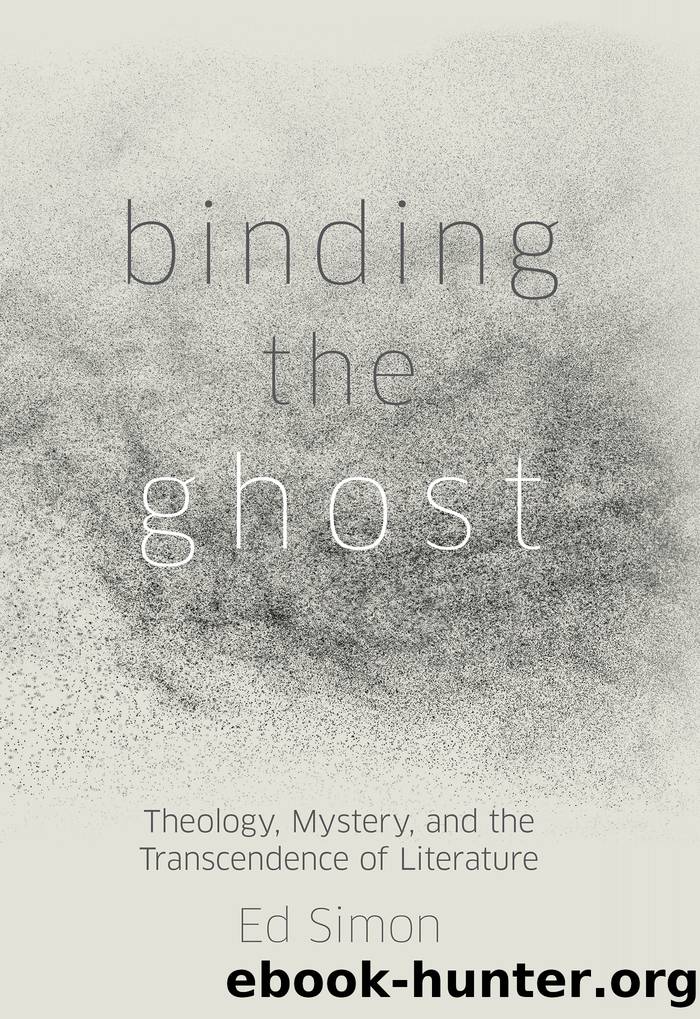Binding the Ghost: Theology, Mystery, and the Transcendence of Literature by Ed Simon

Author:Ed Simon [Simon, Ed]
Language: eng
Format: epub
Tags: LIT000000 Literary Criticism / General, Religion, General, Christian Theology, Literary Criticism, REL013000 Religion / Christianity / Literature & The Arts, Christianity, REL067000 Religion / Christian Theology / General, Literature & the Arts
ISBN: 9781506478777
Google: vwxYEAAAQBAJ
Publisher: Augsburg
Published: 2022-04-19T20:43:56+00:00
14
Neo-Donatists in Eden
Edmund Spenser knew how to turn a phrase. His poetic vision, exemplified by his epic The Faerie Queene, remains in some ways unsurpassed. Though it is a dense, maximalist, incomplete poem of seven books and thousands upon thousands of lines, a complex religious allegory with a massive cast of characters, Spenser could deftly craft quivering lines of exquisite, whispered beauty, as he wrote in 1956âs âProthalamionâ: âCalm was the day, and through the trembling air / Sweet-breathing Zephyrus did softly playâ / A gentle spirit, that lightly did delay / Hot Titanâs beams, which then did glister fair.â One might assume that Spenserâs observation in The Faerie Queene that the ânoblest mind the best contentment hasâ is true of its author, for as he celebrates his own genius in âProthalamion,â his is a verse that commands, âSweete Themmes runne softly, till I end my Song.â
Spenserâs poetry is influential and important, and as is always more crucial, Spenserâs poetry is sublime and sweet. He is able to march into an iambic rhythm like a poetic general, able to allude to the honey-scented winds of Zephyr or the clear waters of Parnassus, but for all of the immaculate lines he strung together, there is also his 1596 pamphlet, A View of the Present State of Ireland. In that piece, he argued that that colonized nation was a âdiseased portion of the State, it must first be cured and reformed,â which he recommended accomplishing through the scorched-earth eradication of Irish culture and people, the elimination of Gaelic, and the forced conversion of the natives. To argue that such a proposal is anything other than a form of ethnic cleansing would be revisionism, an attempt to ameliorate Spenserâs guilt. Spenserâs relationship to genocidal policy was more than just theoretical. He was present at Smerwick in 1580, where a surrendering garrison of Irish, Italian, and Spanish soldiers were massacred, and for his role, Spenser was gifted plantations at both Munster and Kilcolman by the British government. Spenser engaged authoritarian logic, the same type of logic since deployed from Wounded Knee to Wannsee in the language of Manifest Destiny and Lebensraum. He conceived of an Ireland where âin a shorte space there were none almost left, and a most populous and plentyfull countrye suddenly lefte voyde of man or beast.â Despite his greatness as a poet, there must be a serious accounting of how we approach a man like Spenser and thus a poem like The Faerie Queene. As scholars, as teachers, as students, and most importantly, as readers, there must be a moral reckoning on how we reconcile the reality of the poet to the reality of the poem.
Spenser is not the only writer with a darkened biography, especially in his own era. Consider Spenserâs fellow veteran in the Irish campaigns of the Nine Yearsâ War, the ever-romanticized Sir Walter Raleigh. The celebrated explorer, in addition to being a privateer, was also a poet of tremendous talent, whom the undersung modern critic Yvor
Download
This site does not store any files on its server. We only index and link to content provided by other sites. Please contact the content providers to delete copyright contents if any and email us, we'll remove relevant links or contents immediately.
Asking the Right Questions: A Guide to Critical Thinking by M. Neil Browne & Stuart M. Keeley(5758)
Autoboyography by Christina Lauren(5227)
Eat That Frog! by Brian Tracy(4525)
Dialogue by Robert McKee(4389)
Sticky Fingers by Joe Hagan(4188)
Journeys Out of the Body by Robert Monroe(3615)
Annapurna by Maurice Herzog(3464)
Full Circle by Michael Palin(3443)
Schaum's Quick Guide to Writing Great Short Stories by Margaret Lucke(3374)
Elements of Style 2017 by Richard De A'Morelli(3339)
The Art of Dramatic Writing: Its Basis in the Creative Interpretation of Human Motives by Egri Lajos(3058)
Atlas Obscura by Joshua Foer(2952)
Why I Write by George Orwell(2944)
The Diviners by Libba Bray(2927)
The Fight by Norman Mailer(2927)
In Patagonia by Bruce Chatwin(2920)
The Mental Game of Writing: How to Overcome Obstacles, Stay Creative and Productive, and Free Your Mind for Success by James Scott Bell(2897)
Venice by Jan Morris(2568)
The Elements of Style by William Strunk and E. B. White(2470)
